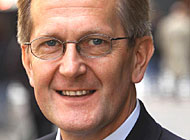Deiss defends outcome of poverty talks

The historic United Nations summit on development aid in Mexico has finished amid acrimony over whether the talks achieved anything solid.
But the Swiss foreign minister, Joseph Deiss, who attended the meeting along with representatives from 171 countries, dismissed the criticism as unfounded.
Deiss said the talks – in Mexico’s industrial capital Monterrey – had galvanized a new global consensus in the fight against poverty.
“There still remain a lot of problems to be solved, but there is a new spirit out of Monterrey,” Deiss told swissinfo.
His comments contrasted with those of groups such as Greenpeace and The Catholic Committee Against Hunger, which issued dismissive assessments of the talks.
Terror and food
The conference was also overshadowed by claims that the United States had hijacked the talks by associating poverty-alleviation with the fight against terrorism.
Critics said the US stance sidestepped the point that poverty was linked to environmental degradation.
The US, along with other western nations, argues that the global threat of terrorism cannot be eliminated without first eradicating global poverty.
Deiss said there was no doubt the two were linked, but suggested over-emphasizing the two was simplistic.
“It is not possible to establish a clear and unique relationship between the two,” Deiss said.
“But it is certain that countries which have enjoyed a certain development where people can be educated in schools – have their food and health – that these countries are not [as] exposed to terrorism and criminality.”
Green growth
Deiss said the talks had been an essential step towards the upcoming world summit on the environment in Johannesburg – in which poverty alleviation and sustainable development are expected to play a central role.
“I would say Monterrey will remain in [my] memory first for having been a very constructive debate on the future of financial development,” Deiss said.
“And for Switzerland, I would stress that our development cooperation policy is well in line with the principles developed in the Monterrey declaration.
Deiss said the declaration was not a binding document, but rather “a statement of general policies on which partnership between developing and donor countries can develop”.
“The final result should be sustainable development and winning the fight against poverty,” he predicted.
One example of how Monterrey might change the world was a renewed push to ensure developing countries play a greater part in world trade.
“We initiated, in Switzerland, a new agency to help those countries without the infrastructure to participate in the activities of the World Trade Organisation,” Deiss said.
By Jacob Greber

In compliance with the JTI standards
More: SWI swissinfo.ch certified by the Journalism Trust Initiative
You can find an overview of ongoing debates with our journalists here. Please join us!
If you want to start a conversation about a topic raised in this article or want to report factual errors, email us at english@swissinfo.ch.